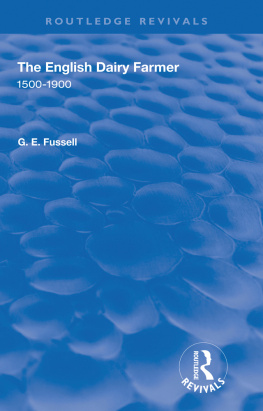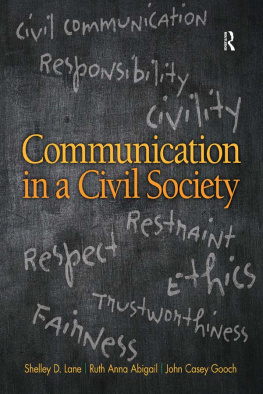STUDIES IN SOCIAL HISTORY
SOCIETY AND POLITICS IN
GERMANY 15001750
SOCIETY AND POLITICS IN
GERMANY 15001750
G. BENECKE
First published in 1974
This edition published in 2007 by
Routledge
2 Park Square, Milton Park, Abingdon, Oxon, OX14 4RN
Routledge is an imprint of Taylor & Francis Group, an informa business
Transferred to Digital Printing 2010
1974 G. Benecke
All rights reserved. No part of this book may be reprinted or reproduced or utilized in any form or by any electronic, mechanical, or other means, now known or hereafter invented, including photocopying and recording, or in any information storage or retrieval system, without permission in writing from the publishers.
The publishers have made every effort to contact authors and copyright holders of the works reprinted in the Studies in Social History series. This has not been possible in every case, however, and we would welcome correspondence from those individuals or organisations we have been unable to trace.
These reprints are taken from original copies of each book. In many cases the condition of these originals is not perfect. The publisher has gone to great lengths to ensure the quality of these reprints, but wishes to point out that certain characteristics of the original copies will, of necessity, be apparent in reprints thereof.
British Library Cataloguing in Publication Data
A CIP catalogue record for this book is
available from the British Library
Society and Politics in Germany 15001750
ISBN10: 0-415-41308-7 (volume)
ISBN10: 0-415-40266-2 (set)
ISBN13: 978-0-415-41308-4 (volume)
ISBN13: 978-0-415-40266-8 (set)
Routledge Library Editions: Studies in Social History
SOCIETY AND POLITICS
IN GERMANY 15001750
G. Benecke
Department of History, University of Kent
LONDON: Routledge & Kegan Paul
TORONTO: University of Toronto Press
First published in 1974
in Great Britain
by Routledge & Kegan Paul Ltd
and in Canada and the United States of America by
University of Toronto Press
Toronto and Buffalo
Set in Monotype Bell
and printed in Great Britain by
Western Printing Services Ltd, Bristol
G. Benecke 1974
No part of this book may be reproduced in
any form without permission from the
publisher, except for the quotation of brief
passages in criticism
RKP ISBN 0 7100 7842 0
UTP ISBN 0 8020 2174 3
Maps
Preface
THIS book attempts a new interpretation of the Holy Roman Empire in Germany from the fifteenth to the eighteenth century. It makes use of regional printed materials and of unpublished state archives from north-west Germany, a large and important region of which no thorough study has yet been published in English. These materials tell us how the early modern Holy Roman Empire actually worked. The book shows how politics were conducted on a loose basis, wherein the federal Empire could only ever be as strong as its component territorial states wished. This strength was not dependent on any national myth or propaganda which would show the origins of a nineteenth-century kleindeutsch-Prussian or grossdeutsch-Austrian cause. Nor is the Empire an example of a chaotic system of society and politics, which it would be the destiny of nineteenth-century German national liberals to overcome by rationalization and centralization. Instead, the strength of the early modern German system of society and politics lay in the way in which the mass of small states co-operated in mundane day-to-day affairs, and the way in which matters were co-ordinated in bodies set up for that specific purpose at federal/Reich/imperial level.
The way in which the records survive dictates that, in order to arrive at a true assessment of the whole, the parts have first and foremost to be studied in their own right. This technical difficulty goes a long way towards explaining why historians have not yet made their long-overdue revision of the real nature of early modern German society and politics. This book is a first study in depth from those specific state archives that show how essential were federal bodiessuch as the Reichstag and its committees, the Reichskammergericht and Reichshofrat, Kreisdirektorien and Kreistage, plus their system of Rmermonate, Trkensteuer and Kammerzielerto German society and politics at state and federal level. The question that this mass of new material above all poses is, how effective and mature was this early modern German system of government?
concludes by summarizing these findings and seeks to point the way to further studies in order to verify the picture obtained from one set of state archives, namely that the Holy Roman Empire provided an effective and mature system of government for early modern Germany that was attuned both to its own needs and to the wider needs of early modern Europe.
I wish to thank Staatsarchivdirektor a.D. Dr Kittel, Staats-archivdirektor Dr Engelbert, their staff at Staatsarchiv Detmold, and Stadtarchivar Dr Hoppe in Lemgo for their interest and generous help, and especially to thank Staatsarchivrat Dr Sagebiel for introducing me to the palaeography, and for his willingness to discuss my work at all times. The views and any remaining errors in the work are my own responsibility.
I acknowledge research grants from St Andrews University and from the Carnegie Trust for the Universities of Scotland in the years 19669. The work presented here is a revised and extended 1970 Ph.D. thesis of St Andrews University, completed under the supervision of Mr. A. F. Upton, to whose guidance and friendship this study owes its existence. Original quotations in German are in the thesis, along with much more expansive footnotes to which attention is drawn.
The thesis also includes a volume in German of selected documents, most of them transcribed from archive originals for the first time. These documents have not been published, but they can be consulted in my thesis, Northwest Germany, Lippe, and the Empire in Early Modern Times, in St Andrews University Library, Scotland.
I also acknowledge with gratitude private assistance from Mrs W. L. H. Butchard, Detmold; Professor ke Nilzn and Fru Britta Nilzn, Stockholm; Frulein Rosa Steinbuch, Berlin; Herr K.-G. Brackemann, Detmold; the Misses Butchard, Cobham, Kent; and encouragement from my contemporaries, Dr Gran Nilzn, Stockholm; Dr Kurt Schuster, Wolfsburg; jur. kand. Anders Lindqvist, Uppsala. Dr David Turley generously saved me from many a pitfall with the text.
I am also indebted to my students at Kent, Jayne Elsmore, Laraine Rynham and Harry Robins, whose critical approach to a crisis in early modern Germany has helped my work immeasurably.







